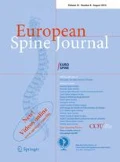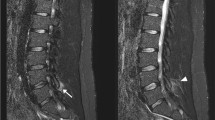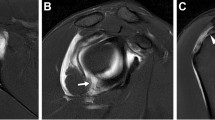Abstract
Traumatic injuries of the spine and spinal cord are common and potentially devastating lesions. We present a comprehensive overview of the classification of vertebral fractures, based on morphology (e.g., wedge, (bi)concave, or crush fractures) or on the mechanism of injury (flexion-compression, axial compression, flexion-distraction, or rotational fracture-dislocation lesions). The merits and limitations of different imaging techniques are discussed, including plain X-ray films, multi-detector computed tomography (MDCT), and magnetic resonance imaging (MRI) for the detection. There is growing evidence that state-of-the-art imaging techniques provide answers to some of the key questions in the management of patients with spine and spinal cord trauma: is the fracture stable or unstable? Is the fracture recent or old? Is the fracture benign or malignant? In summary, we show that high-quality radiological investigations are essential in the diagnosis and management of patients with spinal trauma.






Similar content being viewed by others
References
Van Goethem JW, Maes M, Ozsarlak O, van den Hauwe L, Parizel PM (2005) Imaging in spinal trauma. Eur Radiol 15:582–590
Hu R, Mustard CA, Burns C (1996) Epidemiology of incident spinal fracture in a complete population. Spine 21:492–499
Parizel PM, Gielen JL, Vanhoenacker FM (2007) The spine in sports injuries: the cervical spine. In: Vanhoenacker FM, Maes M, Gielen JL (eds) Imaging of orthopedic sports injuries. Springer, Berlin, pp 377–390
Frankel HL, Hancock DO, Hyslop G, Melzak J, Michaelis LS, Ungar GH, Vernon JD, Walsh JJ (1969) The value of postural reduction in the initial management of closed injuries of the spine with paraplegia and tetraplegia. I Paraplegia 7:179–192
Tsou PM, Wang J, Khoo L, Shamie AN, Holly L (2006) A thoracic and lumbar spine injury severity classification based on neurologic function grade, spinal canal deformity, and spinal biomechanical stability. Spine J 6:636–647
Lenchik L, Rogers LF, Delmas PD, Genant HK (2004) Diagnosis of vertebral osteoporotic fractures: importance of recognition and description by radiologists. AJR Am J Roentgenol 183:949–958
Genant HK, Wu CY, van Kuijk C, Nevitt MC (1993) Vertebral fracture assessment using a semiquantitative technique. J Bone Miner Res 8:1137–1148
Denis F (1983) The three column spine and its significance in the classification of acute thoracolumbar spinal injuries. Spine 8:817–831
Vollmer DG, Gegg C (1997) Classification and acute management of thoracolumbar fractures. Neurosurg Clin N Am 8:499–507
Ferguson RL, Allen BL Jr (1984) A mechanistic classification of thoracolumbar spine fractures. Clin Orthop Relat Res 189:77–88
Singh K, Vaccaro AR, Eichenbaum MD, Fitzhenry LN (2004) The surgical management of thoracolumbar injuries. J Spinal Cord Med 27:95–101
Bensch FV, Koivikko MP, Kiuru MJ, Koskinen SK (2006) The incidence and distribution of burst fractures. Emerg Radiol 12:124–129
McAfee PC, Yuan HA, Fredrickson BE, Lubicky JP (1983) The value of computed tomography in thoracolumbar fractures. An analysis of one hundred consecutive cases and a new classification. J Bone Joint Surg Am 65:461–473
Bernstein MP, Mirvis SE, Shanmuganathan K (2006) Chance-type fractures of the thoracolumbar spine: imaging analysis in 53 patients. AJR Am J Roentgenol 187:859–868
Bagley LJ (2006) Imaging of spinal trauma. Radiol Clin North Am 44:1–12
Frankel HL, Rozycki GS, Ochsner MG, Harviel JD, Champion HR (1994) Indications for obtaining surveillance thoracic and lumbar spine radiographs. J Trauma 37:673–676
Hoffman JR, Schriger DL, Mower W, Luo JS, Zucker M (1992) Low-risk criteria for cervical-spine radiography in blunt trauma: a prospective study. Ann Emerg Med 21:1454–1460
Hoffman JR, Mower WR, Wolfson AB, Todd KH, Zucker MI (2000) Validity of a set of clinical criteria to rule out injury to the cervical spine in patients with blunt trauma. National Emergency X-Radiography Utilization Study Group. N Engl J Med 343:94–99
Hoffman JR, Wolfson AB, Todd K, Mower WR (1998) Selective cervical spine radiography in blunt trauma: methodology of the National Emergency X-Radiography Utilization Study (NEXUS). Ann Emerg Med 32:461–469
Stiell IG, Wells GA, Vandemheen KL, Clement CM, Lesiuk H, De Maio VJ, Laupacis A, Schull M, McKnight RD, Verbeek R, Brison R, Cass D, Dreyer J, Eisenhauer MA, Greenberg GH, MacPhail I, Morrison L, Reardon M, Worthington J (2001) The Canadian C-spine rule for radiography in alert and stable trauma patients. JAMA 17(286):1841–1848
Stiell IG, Clement CM, McKnight RD, Brison R, Schull MJ, Rowe BH, Worthington JR, Eisenhauer MA, Cass D, Greenberg G, MacPhail I, Dreyer J, Lee JS, Bandiera G, Reardon M, Holroyd B, Lesiuk H, Wells GA (2003) The Canadian C-spine rule versus the NEXUS low-risk criteria in patients with trauma. N Engl J Med 349:2510–2518
Ito Z, Harada A, Matsui Y, Takemura M, Wakao N, Suzuki T, Nihashi T, Kawatsu S, Shimokata H, Ishiguro N (2006) Can you diagnose for vertebral fracture correctly by plain X-ray? Osteoporos Int 17:1584–1591
Crim JR, Moore K, Brodke D (2001) Clearance of the cervical spine in multitrauma patients: the role of advanced imaging. Semin Ultrasound CT MR 22:283–305
Woodring JH, Lee C (1993) Limitations of cervical radiography in the evaluation of acute cervical trauma. J Trauma 34:32–39
Griffen MM, Frykberg ER, Kerwin AJ, Schinco MA, Tepas JJ, Rowe K, Abboud J (2003) Radiographic clearance of blunt cervical spine injury: plain radiograph or computed tomography scan? J Trauma 55:222–226
Linsenmaier U, Krotz M, Hauser H, Rock C, Rieger J, Bohndorf K, Pfeifer KJ, Reiser M (2002) Whole-body computed tomography in polytrauma: techniques and management. Eur Radiol 12:1728–1740
Antevil JL, Sise MJ, Sack DI, Kidder B, Hopper A, Brown CV (2006) Spiral computed tomography for the initial evaluation of spine trauma: a new standard of care? J Trauma 61:382–387
Blackmore CC, Mann FA, Wilson AJ (2000) Helical CT in the primary trauma evaluation of the cervical spine: an evidence-based approach. Skeletal Radiol 29:632–639
Platzer P, Jaindl M, Thalhammer G, Dittrich S, Wieland T, Vecsei V, Gaebler C (2006) Clearing the cervical spine in critically injured patients: a comprehensive C-spine protocol to avoid unnecessary delays in diagnosis. Eur Spine J 15:1801–1810
Grogan EL, Morris JA Jr, Dittus RS, Moore DE, Poulose BK, Diaz JJ, Speroff T (2005) Cervical spine evaluation in urban trauma centers: lowering institutional costs and complications through helical CT scan. J Am Coll Surg 200:160–165
Hauser CJ, Visvikis G, Hinrichs C, Eber CD, Cho K, Lavery RF, Livingston DH (2003) Prospective validation of computed tomographic screening of the thoracolumbar spine in trauma. J Trauma 55:228–234
Wintermark M, Mouhsine E, Theumann N, Mordasini P, van Melle G, Leyvraz PF, Schnyder P (2003) Thoracolumbar spine fractures in patients who have sustained severe trauma: depiction with multi-detector row CT. Radiology 227:681–689
Wilmink JT (1999) MR imaging of the spine: trauma and degenerative disease. Eur Radiol 9:1259–1266
Adams JM, Cockburn MI, Difazio LT, Garcia FA, Siegel BK, Bilaniuk JW (2006) Spinal clearance in the difficult trauma patient: a role for screening MRI of the spine. Am Surg 72:101–105
Geck MJ, Yoo S, Wang JC (2001) Assessment of cervical ligamentous injury in trauma patients using MRI. J Spinal Disord 14:371–377
Goradia D, Linnau KF, Cohen WA, Mirza S, Hallam DK, Blackmore CC (2007) Correlation of MR imaging findings with intraoperative findings after cervical spine trauma. AJNR Am J Neuroradiol 28:209–215
Forster BB, Koopmans RA (1995) Magnetic resonance imaging of acute trauma of the cervical spine: spectrum of findings. Can Assoc Radiol J 46:168–173
Van Goethem JW, Ozsarlak O, Parizel PM (2003) Cervical spine fractures and soft tissue injuries. JBR-BTR 86:230–234
Kulkarni MV, McArdle CB, Kopanicky D, Miner M, Cotler HB, Lee KF, Harris JH (1987) Acute spinal cord injury: MR imaging at 1.5 T. Radiol 164:837–843
Kalra V, Gulati S, Kamate M, Garg A (2006) SCIWORA-Spinal Cord Injury Without Radiological Abnormality. Indian J Pediatr 73:829–831
Shen H, Tang Y, Huang L, Yang R, Wu Y, Wang P, Shi Y, He X, Liu H, Ye J (2007) Applications of diffusion-weighted MRI in thoracic spinal cord injury without radiographic abnormality. Int Orthop 31:375–383
Voormolen MH, van Rooij WJ, van der Graaf Y, Lohle PN, Lampmann LE, Juttmann JR, Sluzewski M (2006) Bone marrow edema in osteoporotic vertebral compression fractures after percutaneous vertebroplasty and relation with clinical outcome. AJNR Am J Neuroradiol 27:983–988
Kim CW, Perry A, Garfin SR (2005) Spinal instability: the orthopedic approach. Semin Musculoskelet Radiol 9:77–87
White AA, Panjabi MM (1990) Clinical Biomechanics of the Spine, 2nd edn). Lippincott Williams & Wilkins, Philadelphia. ISBN 0-397-50720-8
An HS, Andreshak TG, Nguyen C, Williams A, Daniels D (1995) Can we distinguish between benign versus malignant compression fractures of the spine by magnetic resonance imaging? Spine 20:1776–1782
Jung HS, Jee WH, McCauley TR, Ha KY, Choi KH (2003) Discrimination of metastatic from acute osteoporotic compression spinal fractures with MR imaging. Radiographics 23:179–187
Baur A, Stabler A, Bruning R, Bartl R, Krodel A, Reiser M, Deimling M (1998) Diffusion-weighted MR imaging of bone marrow: differentiation of benign versus pathologic compression fractures. Radiology 207:349–356
Park SW, Lee JH, Ehara S, Park YB, Sung SO, Choi JA, Joo YE (2004) Single shot fast spin echo diffusion-weighted MR imaging of the spine: is it useful in differentiating malignant metastatic tumor infiltration from benign fracture edema? Clin Imaging 28:102–108
Thurnher MM, Bammer R (2006) Diffusion-weighted magnetic resonance imaging of the spine and spinal cord. Semin Roentgenol 41:294–311
Castillo M, Arbelaez A, Smith JK, Fisher LL (2000) Diffusion-weighted MR imaging offers no advantage over routine noncontrast MR imaging in the detection of vertebral metastases. AJNR Am J Neuroradiol 21:948–953
Erly WK, Oh ES, Outwater EK (2006) The utility of in-phase/opposed-phase imaging in differentiating malignancy from acute benign compression fractures of the spine. AJNR Am J Neuroradiol 27(6):1183–1188
Zajick DC Jr, Morrison WB, Schweitzer ME, Parellada JA, Carrino JA (2005) Benign and malignant processes: normal values and differentiation with chemical shift MR imaging in vertebral marrow. Radiology 237:590–596
Fanucci E, Manenti G, Masala S, Laviani F, Di Costanzo G, Ludovici A et al (2007) Multiparameter characterisation of vertebral osteoporosis with 3-Tesla MR. Radiol Med (Torino) 112(2):208–223
Conflict of interest statement
None of the authors has any potential conflict of interest.
Author information
Authors and Affiliations
Corresponding author
Rights and permissions
About this article
Cite this article
Parizel, P.M., van der Zijden, T., Gaudino, S. et al. Trauma of the spine and spinal cord: imaging strategies. Eur Spine J 19 (Suppl 1), 8–17 (2010). https://doi.org/10.1007/s00586-009-1123-5
Received:
Published:
Issue Date:
DOI: https://doi.org/10.1007/s00586-009-1123-5




